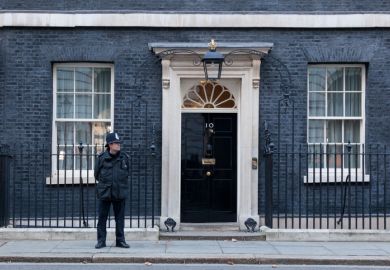The core budget for the UK’s public research funder will fall by several hundred million pounds this year, mainly because of cuts in the government’s overseas aid budget, it has been announced.
UK Research and Innovation said that its government allocation for 2021-22 of £7.9 billion was £403 million, or 5 per cent, lower compared with 2020-21, something that was “primarily accounted for” by a £284 million loss from its Official Development Assistance (ODA) budget.
Funding for scores of research projects has been left in doubt after it emerged that cuts to the foreign aid budget would impact UKRI funding, mainly through the Global Challenges Research Fund and the Newton Fund, whose budgets have slashed by 70 per cent to £125 million.
UKRI is still yet to announce exactly how current projects will be affected; in its overall budget announcement the funder would say only that it had “conducted a separate ODA review to determine the impact on individual grants”.
“We are subject to a cap on our total ODA budget, which means that we are unable to move funds from other budgets to fill the gap between our ODA allocation and our commitments,” its budget document adds.
The document says the impact of the ODA cuts on individual research councils “will vary depending on the proportion of their total budgets accounted for by ODA programmes”.
Core research council budgets outside ODA funding mostly appear to show an increase on last year. However, UKRI warns that new funding commitments made during the pandemic – and the postponement of other projects resulting from the crisis – limit “the scope for substantial new activities in this financial year”.
“Within the limited headroom remaining after meeting commitments, the UKRI board sought to increase the resilience of the research and innovation system, to maintain diversity across that system, and to invest in programmes that support innovation and post-pandemic recovery.”
Dame Ottoline Leyser, UKRI chief executive, said the past year had been “tremendously difficult for the research and innovation community on a number of levels, but its response has been equally remarkable”.
“Research and innovation has a key role to play in the recovery, fuelling a more inclusive and greener knowledge economy driving up prosperity and well-being across the UK,” she said.
“To allow us to capture this opportunity, it will be important for us to continue to work together over the coming months to present the strongest possible case for increased and sustained investment in the sector at the next comprehensive spending review expected in November.”
UKRI’s announcement on its budget was made alongside the UK’s Department for Business, Energy and Industrial Strategy – which funds UKRI – saying that it would allocate a total of £11.35 billion for research and development in 2021-22.
This includes about £1.3 billion set aside for the UK’s association to the European Commission’s Horizon Europe research programme, funding that was announced only in April after weeks of growing concern that the money would have to come from existing UKRI research budgets.
Overall government research and development spending for 2021-22 of £14.9 billion – which BEIS said showed “progress towards our target to increase total public and private R&D investment to 2.4% of gross domestic product (GDP) by 2027” – includes this Horizon Europe allocation. Previously, total government R&D spending would not have included funding for European Union programmes because this formed part of the UK’s annual contribution to the bloc.
The BEIS funding allocations also reveal that the UK’s new “high-risk, high-reward” Advanced Research and Invention Agency (Aria) – which is being set up outside UKRI – will receive an initial £50 million in funding this year. It has been pledged a total budget of £800 million between now and 2024-25.
Register to continue
Why register?
- Registration is free and only takes a moment
- Once registered, you can read 3 articles a month
- Sign up for our newsletter
Subscribe
Or subscribe for unlimited access to:
- Unlimited access to news, views, insights & reviews
- Digital editions
- Digital access to THE’s university and college rankings analysis
Already registered or a current subscriber? Login








